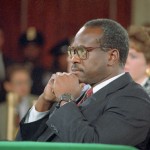Closing the Book on the Thomas Story
 Despite new allegations from a former girlfriend of Justice Clarence Thomas, Washington looks ready to move on from the controversy.
Despite new allegations from a former girlfriend of Justice Clarence Thomas, Washington looks ready to move on from the controversy.
Clarence Thomas’ former girlfriend, lawyer Lillian McEwan, appeared on Larry King last evening and made new allegations: that Thomas had a pornography fetish, that he may have been an alcoholic, but later gave up drinking and became “asexual” and a “bully” to his son.
This is big news: McEwan’s newest allegations lend further credence to the notion that Thomas may have shaded the facts during his confirmation hearings. The problem for McEwan is that almost no one in the political world wants to talk about what happened 20 years ago – with the possible exception of Thomas’ wife, Virginia, who left a voice mail on Anita Hill’s machine a few days before the McEwan interview.
Of course, McEwan has her own reasons to hype up the issue: she is currently shopping a book about her career and relationship with Supreme Court Associate Justice Clarence Thomas.
But those who were most prominently involved in the 1991 confirmation hearings have largely stayed mum. FrumForum contacted a dozen individuals who were prominently involved with the Thomas nomination, on both sides of the issue, to see how their views might have changed over the years. The result was total and utter silence – no responses or no comments all around.
For decades, conservatives and liberals have lived in a dual reality: to conservatives, Hill is a liar; to liberals, she’s a victim.
Some evidence has emerged to corroborate Hill’s allegations that Thomas was once interested in pornography. While some on the left accuse Thomas of perjury, none will suggest that any action be taken – after all, half a decade later, so many of the same people denied that perjury was an impeachable offense for Bill Clinton.
It may be that most of the figures involved in the controversy have simply long since moved on. Arlen Specter is now a Democrat, Joe Biden has become Vice-President, and David Brock has renounced everything he ever did for the conservative movement, let alone said about Anita Hill.
Or it may be that – as with the Clinton impeachment – the moral ambiguity of the underlying facts makes accusations of “perjury” less compelling than in, say, a case of financial fraud.
Richard Cohen makes the case in the Washington Post that everyone should just forget about the story:
I long ago despaired of getting to the bottom of this case, and I long ago gave up wanting to… Some of this is self-protection. I was young and boorish once myself and have turned out to be a veritable saint. I venture to say we all did and said terrible things when we were young, which is why nature protects the elderly with failing memories. I want to forget both Hill and Thomas. Let us media types let go of this story. It no longer says anything about them. But it says nothing good about us.
And that may very well be why those who were most passionate about the Clarence Thomas confirmation when it happened are so hard to reach now. And perhaps, given this, the Clarence Thomas controversy should be left where its former players want it: on its natural course, fading into oblivion.
Add Tim on twitter: www.twitter.com/timkmak